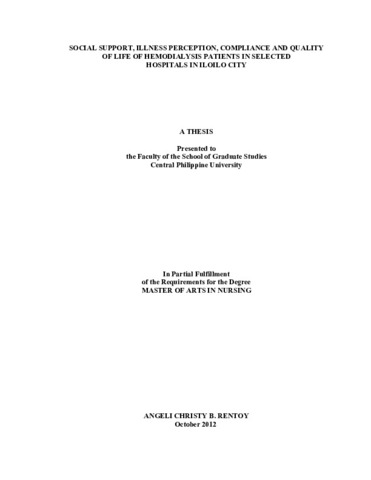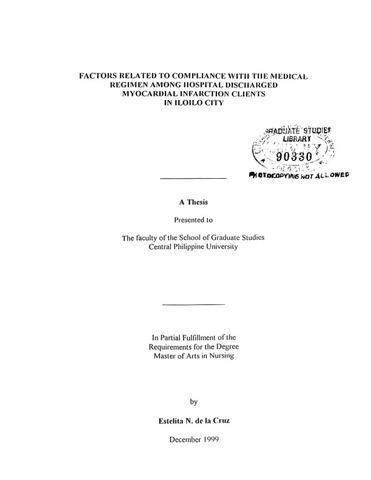Social support, illness perception, compliance and quality of life on hemodialysis patients in selected hospitals in Iloilo City

Page views
879Date
2012Author
Thesis Adviser
Defense Panel Chair
Share
Metadata
Show full item record
Abstract
This study was conducted in order to determine the social support, illness perception, compliance and quality of life of hemodialysis patients in Iloilo. Specifically, it tried to determine the personal characteristics of the respondents in terms of age, sex, educational attainment, civil status and family income. It also tried to determine the level of social support given to the patients, their ESRD illness perception, compliance to hemodialysis treatment as well as their quality of life. Moreover, it also tried to determine whether there was a significant relationship between their personal characteristics and social support, illness perception, compliance and quality of life.
Furthermore, it also tried to determine significant relationship between social support and illness perception, social support and compliance to hemodialysis treatment, social support and quality of life, illness perception and compliance, illness perception and quality of life and compliance and quality of life. All of the 56 patients of St. Paul’s Hospital, Iloilo Doctor’s Hospital and Iloilo Mission Hospital were included in this descriptive study. Data gathering instrument was a questionnaire and the study was conducted from June 15 to July 15, 2012. Analysis of data involved the use of both descriptive ad inferential statistical tools with the help of the Statistical Package for Social Science (SPSS) Software Program for Windows, version 17.0.
Results revealed that majority of the respondents were older than 55 years old, female, had higher level of education and were married. There was almost an equal distribution of respondents according to family income. The respondents, in general, enjoyed high social support, had positive perceptions about their illness, had good compliance to hemodialysis treatment and had generally good quality of life. There was no significant relationship between the personal characteristics of the respondents in terms of age, sex, educational attainment, civil status and family income and the social support they received. There was no significant relationship between the personal characteristics of the respondents in terms of age, sex, educational attainment and family income and the ESRD illness perception of the respondents. There was no significant relationship between the personal characteristics of the respondents in terms of age, sex, civil status and family income and the compliance to hemodialysis treatment among the respondents.
However, a positive substantial and statistically significant relationship was determined between educational attainment and compliance to hemodialysis treatment. There was no significant relationship between the personal characteristics of the respondents in terms of age, sex, civil status and family income and the quality of life of the respondents. However, a positive substantial and statistically significant relationship was determined between educational attainment and quality of life. The level of social support was not related to the illness perception, compliance to hemodialysis treatment and the quality of life of the respondents. The illness perception of the respondents had a low positive and statistically significant relationship with compliance to hemodialysis treatment and quality of life.
The compliance to hemodialysis treatment was had a low positive and statistically significant relationship with quality of life. It was concluded that education is related to the compliance to hemodialysis treatment and quality of life of patients. It was therefore recommended that health workers focus on patients with lesser educational attainment in giving information and education about ESRD and hemodialysis treatment to encourage good compliance and improve quality of life. It was also concluded that illness perception was in a low way, related to compliance to hemodialysis treatment and quality of life.
It was therefore recommended that health workers as well as the support group of the patients should motivate them to change the perceptions about their illness, especially in terms of consequences and personal as well as treatment control. A positive perception could increase the motivation of the patient to comply with the treatment regimen and thus improve their quality of life. It was further concluded that compliance to hemodialysis treatment was found to be related to quality of life. It was therefore recommended that patients follow, without fail, the treatment recommended by their health provider. The support group of the patients should also help the patients comply with the hemodialysis treatment in order to improve quality of life.
Description
Abstract only
Suggested Citation
Rentoy, A. C. B. (2012). Social support, illness perception, compliance and quality of life on hemodialysis patients in selected hospitals in Iloilo City (Unpublished Master’s thesis). Central Philippine University, Jaro, Iloilo City.
Type
ThesisSubject(s)
Keywords
Department
School of Graduate StudiesDegree
Master of Arts in NursingShelf Location
GSL Theses 610.73072 R298
Physical Description
144 leaves
Collections
Related items
Showing items related by title, author, creator and subject.
-
Factors related to compliance with the medical regimen among hospital discharged myocardial infarction clients in Iloilo City
De la Cruz, Estelita N. (1999)This study determined the factors related to compliance with medical regimen to medication, diet and exercise. The factors examined in relation to compliance include: myocardial infarction clients’ personal characteristics, ... -
Factors that influence compliance with TB short-course chemotherapy of TB clients of the health centers of Iloilo City
Sanoy-Alinsao, Violeta S. (1998)This study was conducted to look into the factors that influence compliance with TB Short-Course Chemotherapy (TB SCC) of the National TB Program (NTP) registered TB clients of the health centers in the six districts of ... -
Advocacy in nursing: Perceptions, attitudes and involvement of nurses in a government hospital
Quimpo, Dearose M. (2017)The healthcare system is becoming more complex because of the continuous development of medical technology and new systems requiring multiple medical disciplines in dealing with the patient’s healthcare. Decision-making ...






